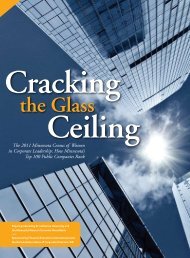temporary restraining order - Finance & Commerce
temporary restraining order - Finance & Commerce
temporary restraining order - Finance & Commerce
You also want an ePaper? Increase the reach of your titles
YUMPU automatically turns print PDFs into web optimized ePapers that Google loves.
consideration and the other three factors only receive secondary consideration. See, e.g., S&M<br />
Constructors, Inc. v. Foley Co., 959 F.2d 97, 98 (8 th Cir. 1992) (applying equivalent federal test<br />
for injunctive relief). Moreover, at this early stage, the Court should focus on the need to<br />
maintain the status quo, so that the matter can be fully presented and decided on the merits.<br />
Pacific Equip. & Irrigation, Inc., 519 N.W.2d at 915. Preserving the status quo means<br />
preventing the expenditure of funds and the performance of work on the Project.<br />
Plaintiffs will re<strong>order</strong> the discussion of the Dahlberg factors so that the factor of greatest<br />
importance – likelihood of success on the merits – is analyzed first. Thereafter, Plaintiffs will<br />
analyze the balance of harms, the second most important Dahlberg factor, and lastly, they will<br />
analyze the other three factors because of their secondary importance.<br />
1. Plaintiffs will prevail on the merits.<br />
a. Competitive procurement is mandatory on public contracts.<br />
Under the Uniform Municipal Contracting Law, Minn. Stat. § 471.345, municipalities<br />
like the City must generally engage in a competitive process before entering a contract that<br />
exceeds $100,000. A “contract” under the Uniform Municipal Contracting Law is defined as “an<br />
agreement entered into by a municipality for the sale or purchase of supplies, materials,<br />
equipment or the rental thereof, or the construction, alteration, repair or maintenance of real or<br />
personal property.” Minn. Stat. § 471.345 subd. 2. An agreement to construct a stadium falls<br />
within that definition.<br />
bidding.<br />
The most common competitive procurement method used by municipalities is sealed<br />
If the amount of the contract is estimated to exceed $100,000, sealed bids shall be<br />
solicited by public notice in the manner and subject to the requirements of the law<br />
governing contracts by the particular municipality or class thereof.<br />
N:\PL\85155\85155-001\1607234.docx 7



